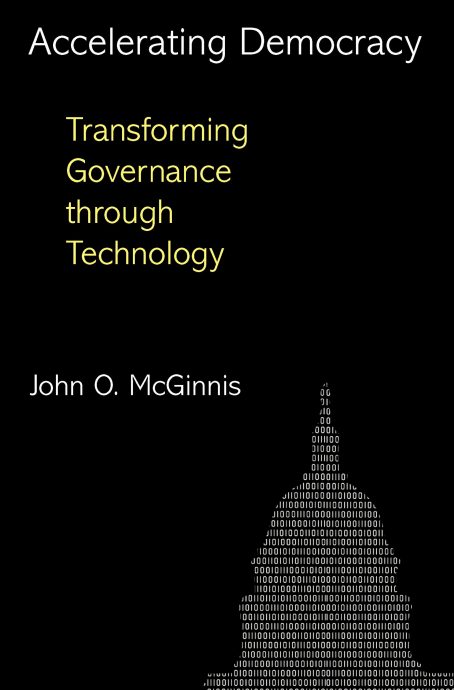The Supreme Court’s legitimacy is rooted in virtues encompassing more than a method of interpretation.
Creating a More Decentralized and Market Driven Democracy
Princeton University Press had just published a new paperback edition of my book, Accelerating Democracy: Transforming Governance Through Technology. It argues for using the tools given by our new computational technology to help democracy adapt to our accelerating rate of social change.
The basic insight of the book should be congenial to friends of the classical liberal tradition in political thought. It is to deploy decentralized mechanisms that modern technology makes possible to improve self-government. For instance, the internet greatly facilitates betting pools, called information or prediction markets, which permit people to bet on the occurrence of future events. Such markets already gauge election results more accurately than polls. If legalized and modestly subsidized, they could also foretell many policy results better than politicians or experts alone. We could then better predict the consequences of changes in educational policy on educational outcomes or a stimulus program on economic growth. In short, such markets would provide a visible hand to help guide policy results. Unfortunately, while such markets are a public good, our government now impedes them at every turn.
The internet today also encourages dispersed media like blogs to intensify confrontations about contending policy claims. Previously a less diverse mainstream media tended to settle for received wisdom. Our more competitive media culture permits the rapid recombination of innovative policy proposals no less than our more competitive scientific culture provides an incubator for new computer applications. To take maximum advantage of this new culture we need to preserve the maximum freedom for citizens independent of party to bring to bear these new views in our elections. Unfortunately, our current President has endorsed a constitutional amendment that would allow the quintessential representatives of centralized government—the legislators themselves—to regulate the diverse voices that our new technology makes possible.
Because of this ever greater computational capacity, society can also use more effective methods of social science to evaluate empirically the results of policies. Like predictions markets and dispersed media, the turn to empiricism benefits from competitive structures. Different jurisdictions, such as states or school districts, try to gain advantages over one another by adopting better policies. With our more sophisticated empirical tools we can then assess the effect of their different policies, gauging the degree to which gun control helps prevent crime or whether longer school hours improve student learning. Unfortunately, centralized solutions, like Obamacare, are more costly than ever before, because we can learn so much from decentralized alternatives.
The plea of book is recognize that government can now become a less top-down, error-prone affair. Today, technology permits knowledge to bubble up from more dispersed sources filtered through more competitive mechanisms, sustaining a more decentralized system of social discovery. We can acquire general expertise without being beholden to particular experts.
Democracy today needs to be right more often and more quickly, because our accelerating technology creates more rapidly developing threats abroad, like new weapons of mass destruction, and new dislocations at home, like the disruption of employment through automation. Man is both homo faber–nature’s preeminent maker of tools to change the world– and homo sapiens–nature’s master of symbols and language to represent and understand it. We will continue to thrive only if these capacities develop in tandem.

